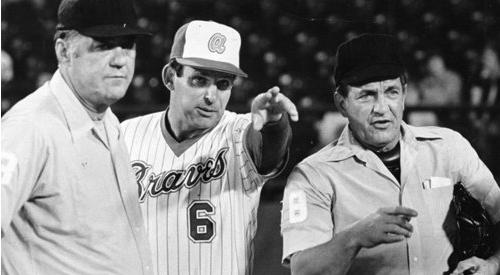
The Changing of the Manager
It’s been a bad year for managers. News broke on Thursday of Sparky Anderson’s death at 76. Bobby Cox retired as the Braves’ skipper at the end of the season, as did the Toronto Blue Jays’ Cito Gaston and Lou Piniella of the Cubs back in July.
With their retirements marks the end of a certain kind of manager, the kind who got in the face of umpires and yelled and screamed and threw a unique brand of fits. Nobody could freak out like Piniella, except maybe Cox, who holds the record for most times ejected from a ballgame. And conversely, nobody was more laid-back than Gaston who sometimes looked comatose in the dugout.
In them we lose the kind of baseball managers who go with their gut, so to speak: Gaston’s laid-back demeanor cloaked an attitude of letting the players almost manage themselves, a show of trust in their talents. At the same time, the spark of a Piniella or Cox came at the same point from the other side: he was more than willing to fight for them, often at the drop of a hat and always, always viciously.
In the wake is another, more analytical type of manager, one who uses statistics and reasoning and looks so smart while hanging around in his pajamas: a Joe Maddon type of guy. Somebody like Tony La Russa and his stacks of index cards or Joe Girardi and his binders. They don’t manage by instinct, they have reams and stacks of data and knowledge they can draw upon.
After all, they know what they’re doing. Like everything else now in society, they amass knowledge and keep it in case it ever needs use. How does Marco Scutaro hit against fastballing lefties? What kind of hitter should we pinch hit against Chad Qualls? Consult the books.
[php snippet=1]
This isn’t meant to chastise newer managers for using every tool they can to win (I know I would if my job depended on it) as much as it is to recognize that the older way of doing things is, well, old and fading.
Think of that kind of manager, of the guy who runs up and out of the dugout and screams at an umpire. It probably looks something like this, although maybe without quite as many swears. But think about that video. Earl Weaver is already old and looks comical in his excitablilty. The footage is grainy, has tracking problems and low quality. It’s ancient, old school, and it’s not at all what we’d expect now.
True, there are old-school managers still in the game; Jim Leyland and his smokes come to mind. And managers will always freak out at umpires regardless of their own pedigree; bad calls will always happen.
But the degree to which managing has improved and changed means the old school is quickly fading away into a mass of sabremetrics. Does it make for better baseball teams? It sure does. One can look at the Red Sox, who combine statistical analysis with a high payroll and are a perrenial contender for the AL East. One could look at Maddon or La Russa and how they appear so learned in a sport once dominated by Yogi Berra-isms. Or one could look at how society itself is changing.
To some degree, it’s how we like to laugh at people now. It’s a lot of a fun to laugh at somebody getting so worked up over a ball game. It’s funny to see the old man in uniform come up out of the dugout. As people appreciate a display of violent rage and affection, it can’t be helped when it’s looked at cynically, like it’s a joke.
When somebody sees an ump get chewed out, what’s their initial reaction? It sure isn’t “I hope the manager can clearly state his case and persuade the official.” Was it this way even as recently as Bobby Cox’s heyday? Maybe, but there wasn’t a YouTube for his shouting to be constantly replayed over and over until any credibility he could possibly have left vanishes.
As a whole, society is a lot more informed than it was even 50 years ago. Almost anything we could want to know is now only a few clicks away. It seems fitting that we want our sports teams to exist in the same level of knowledge, where they have access to data on almost every minute detail.
Just look at an NFL sideline some time, where the coaches all have headsets, are in constant communication with players and have photos and binders of all data they could even think of using to tweak their strategy. The only gut decisions made in football involve the caterers.
So it makes sense for baseball, the slowest-moving sport of all, to change. It’s simply just keeping pace with the rest of the world, using all available knowledge in making a decision. But don’t worry, manager passion isn’t dead, not when so much of the game comes down to the most unscientific thing in sports: the judgement of an umpire.
No wonder even Maddon gets mad.
[php snippet=1]

